-
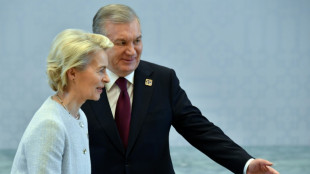 EU announces 'new era' in relations with Central Asia
EU announces 'new era' in relations with Central Asia
-
Greece nixes Acropolis shoot for 'Poor Things' director

-
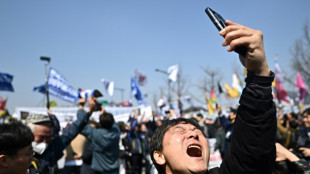 'Historic moment': South Koreans react to Yoon's dismissal
'Historic moment': South Koreans react to Yoon's dismissal
-
Israel kills Hamas commander in Lebanon strike

-
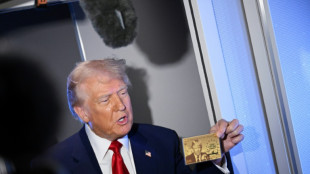 Trump unveils first $5 million 'gold card' visa
Trump unveils first $5 million 'gold card' visa
-
Crashes, fires as Piastri fastest in chaotic second Japan GP practice

-
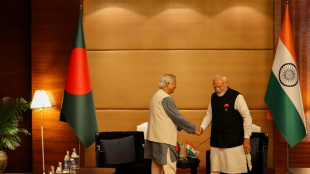 India and Bangladesh leaders meet for first time since revolution
India and Bangladesh leaders meet for first time since revolution
-
Israel expands ground offensive in Gaza

-
 Families of Duterte drug war victims demand probe into online threats
Families of Duterte drug war victims demand probe into online threats
-
Stocks extend global rout after Trump's shock tariff blitz

-
 Kolkata's Iyer more bothered about impact than price tag
Kolkata's Iyer more bothered about impact than price tag
-
BP chairman to step down after energy strategy reset
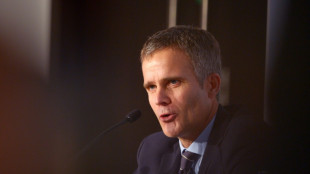
-
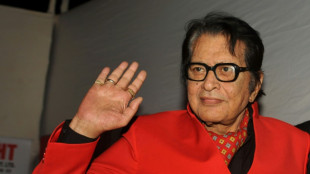 Indian patriotic movie 'icon' Manoj Kumar dies aged 87
Indian patriotic movie 'icon' Manoj Kumar dies aged 87
-
China floats battle barges in Taiwan invasion plans
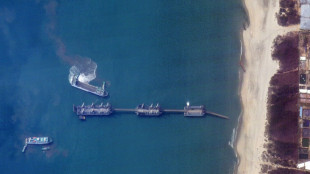
-
 McLaren's Piastri fastest in chaotic second Japanese GP practice
McLaren's Piastri fastest in chaotic second Japanese GP practice
-
South Korea seize two tons of cocaine in largest-ever drug bust
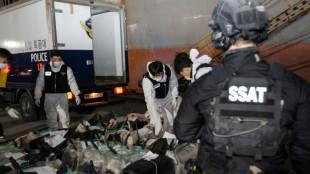
-
 Pacific nations perplexed, worried by Trump tariffs
Pacific nations perplexed, worried by Trump tariffs
-
The race to save the Amazon's bushy-bearded monkeys

-
 TikTok must find non-Chinese owner by Saturday to avert US ban
TikTok must find non-Chinese owner by Saturday to avert US ban
-
Trump tariffs to test resiliency of US consumers
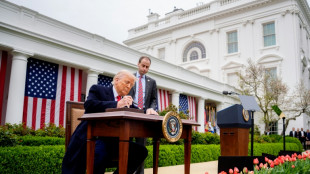
-
 Clamping down on 'forever chemicals'
Clamping down on 'forever chemicals'
-
Prominent US academic facing royal insult charge in Thailand
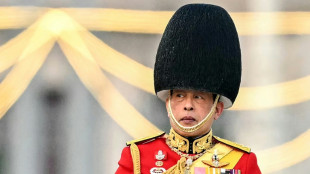
-
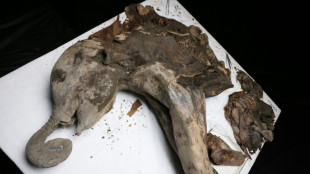 Yana, a 130,000-year-old baby mammoth, goes under the scalpel
Yana, a 130,000-year-old baby mammoth, goes under the scalpel
-
'Don't want to die': Lesotho HIV patients look to traditional medicine

-
 Curry scores 37 as Warriors outgun LeBron's Lakers
Curry scores 37 as Warriors outgun LeBron's Lakers
-
Crops under threat as surprise March heatwave hits Central Asia: study

-
 Japan PM says Trump tariffs a 'national crisis'
Japan PM says Trump tariffs a 'national crisis'
-
Security 'breakdown' allows armed men into Melbourne's MCG

-
 Norris fastest in Japan GP first practice, Tsunoda sixth on Red Bull debut
Norris fastest in Japan GP first practice, Tsunoda sixth on Red Bull debut
-
Albon says Thailand taking bid for F1 race 'very seriously'

-
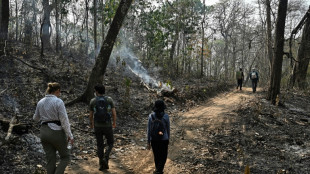 'It's gone': conservation science in Thailand's burning forest
'It's gone': conservation science in Thailand's burning forest
-
Protest as quake-hit Myanmar junta chief joins Bangkok summit

-
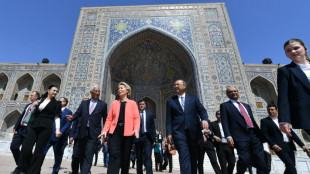 EU leaders push for influence at Central Asia summit
EU leaders push for influence at Central Asia summit
-
Asian stocks extend global rout after Trump's shock tariff blitz

-
 Lewandowski, Mbappe duel fuelling tight La Liga title race
Lewandowski, Mbappe duel fuelling tight La Liga title race
-
South Korea court upholds President Yoon's impeachment, strips him of office

-
 Liverpool march towards title as Man City face Man Utd
Liverpool march towards title as Man City face Man Utd
-
Finland's colossal bomb shelters a model for jittery Europe

-
 Athletes frustrated as France mulls Muslim headscarf ban in sport
Athletes frustrated as France mulls Muslim headscarf ban in sport
-
Korda downs Kupcho to stay alive at LPGA Match Play

-
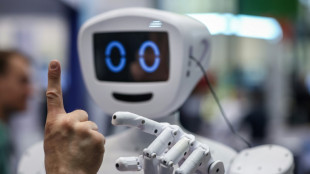 German industry grapples with AI at trade fair
German industry grapples with AI at trade fair
-
Irish school trains thatchers to save iconic roofs

-
 'Frightening': US restaurants, producers face tariff whiplash
'Frightening': US restaurants, producers face tariff whiplash
-
Cuba looks to sun to solve its energy crisis
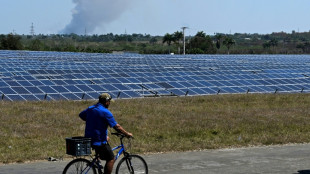
-
 Experts warn 'AI-written' paper is latest spin on climate change denial
Experts warn 'AI-written' paper is latest spin on climate change denial
-
PSG eye becoming France's first 'Invincibles'

-
 Late birdie burst lifts Ryder to Texas Open lead
Late birdie burst lifts Ryder to Texas Open lead
-
Five potential Grand National fairytale endings

-
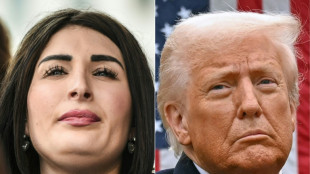 Trump purges national security team after meeting conspiracist
Trump purges national security team after meeting conspiracist
-
More work for McIlroy even with two wins before Masters

Stargate project, Trump and the AI war...
In a dramatic return to the global political stage, former President Donald J. Trump, as the current 47th President of the United States of America, has unveiled his latest initiative, the so-called ‘Stargate Project,’ in a bid to cement the United States’ dominance in artificial intelligence and outpace China’s meteoric rise in the field. The newly announced programme, cloaked in patriotic rhetoric and ambitious targets, is already stirring intense debate over the future of technological competition between the world’s two largest economies.
According to preliminary statements from Trump’s team, the Stargate Project will consolidate the efforts of leading American tech conglomerates, defence contractors, and research universities under a centralised framework. The former president, who has long championed American exceptionalism, claims this approach will provide the United States with a decisive advantage, enabling rapid breakthroughs in cutting-edge AI applications ranging from military strategy to commercial innovation.
“America must remain the global leader in technology—no ifs, no buts,” Trump declared at a recent press conference. “China has been trying to surpass us in AI, but with this new project, we will make sure the future remains ours.”
Details regarding funding and governance remain scarce, but early indications suggest the initiative will rely heavily on public-private partnerships, tax incentives for research and development, and collaboration with high-profile venture capital firms. Skeptics, however, warn that the endeavour could fan the flames of an increasingly militarised AI race, raising ethical concerns about surveillance, automation of warfare, and data privacy. Critics also question whether the initiative can deliver on its lofty promises, especially in the face of existing economic and geopolitical pressures.
Yet for its supporters, the Stargate Project serves as a rallying cry for renewed American leadership and an antidote to worries over China’s technological ascendancy. Proponents argue that accelerating AI research is paramount if the United States wishes to preserve not just military supremacy, but also the economic and cultural influence that has typified its global role for decades.
Whether this bold project will succeed—or if it will devolve into a symbolic gesture—remains to be seen. What is certain, however, is that the Stargate Project has already reignited debate about how best to safeguard America’s strategic future and maintain the balance of power in the fast-evolving arena of artificial intelligence.

Ukraine's fight against the Russian terrorist state

Live coverage of HM Queen Elizabeth II's state funeral

LIVE: Farewell to Queen Elizabeth II.

King Charles III promises 'lifelong service' to the Nation

The Queen: From Churchill to Yeltsin and Tito to Trudeau

Queen Elizabeth II dies aged 96

Ukraine: Kherson, nuclear inspectors and Russian army

Why Lithuania didn't join the tributes to Gorbachev

Germany: River Rhine water levels could fall to critical low



